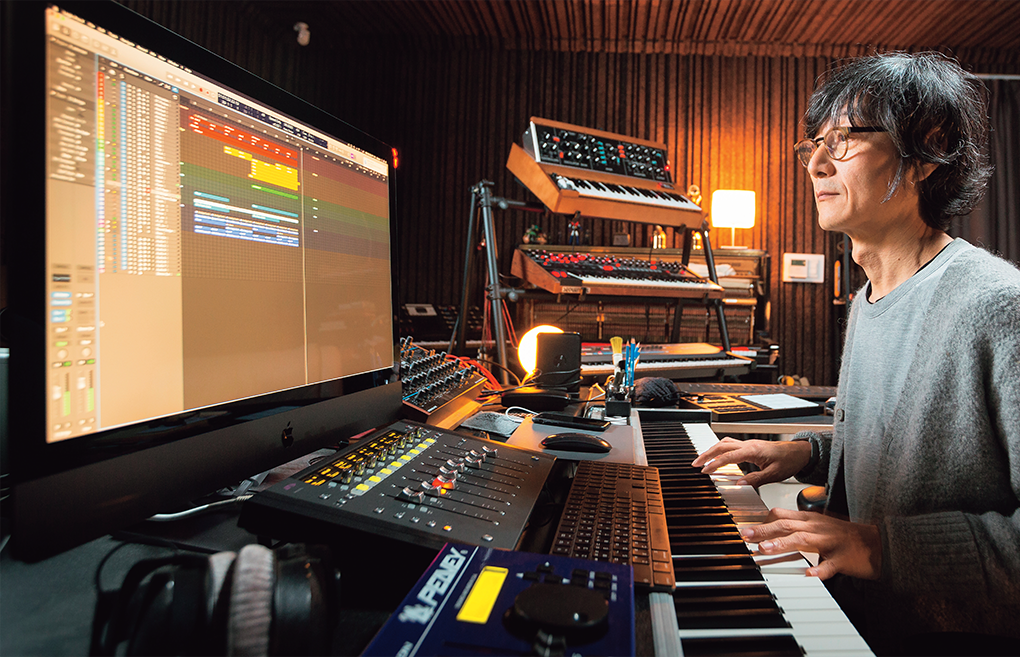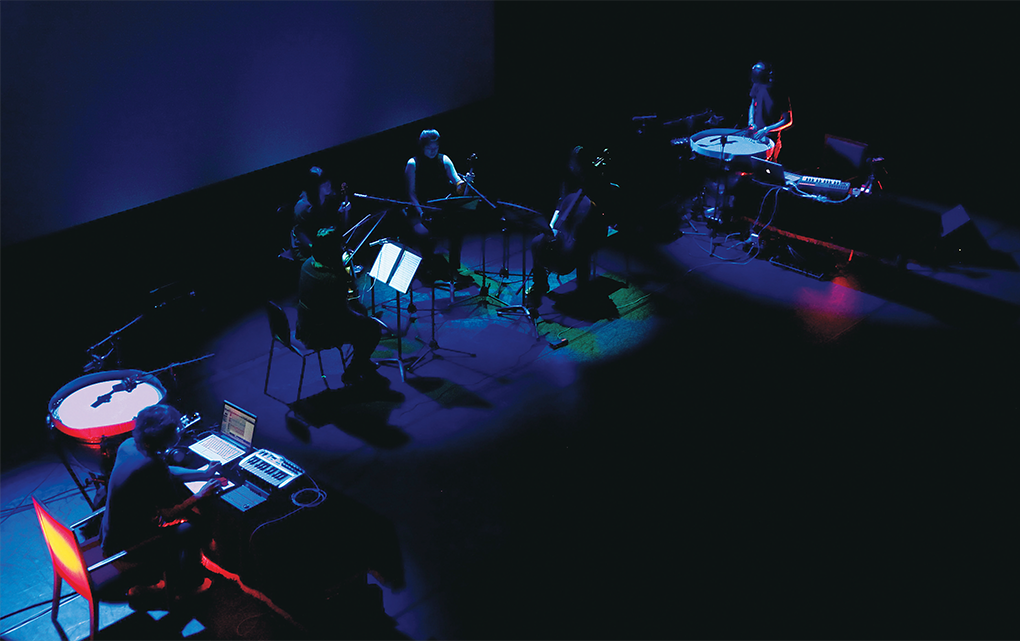As a musician, Dalparan has been in the vanguard of every new genre; he is now revolutionizing the Korean film music scene. Since his first score for “Bad Movie” drew him into film music in 1997, he has built up an impressive oeuvre with relentless originality in his sound design, but he remains full of ambition, saying that he is “not yet completely satisfied.”

Dalparan works at his studio in Paju, Gyeonggi Province. He says, “The music must never overtake the film, you have to design it naturally from within the film itself.”
Dalparan (“Moonblue” birth name Kang Ki-young) brings revolution wherever he goes. First, he was a member of a few great heavy metal and alternative rock bands. Then, he became an electronic music DJ. Now, he belongs to a tiny group of composers deemed essential to a Korean film’s chance of success.
Alone or with his fellow composer, Jang Young-gyu, Dalparan has crafted a mosaic of unique cinematic scores for the 21st century. “A Bittersweet Life” (2005), “The Good, the Bad, the Weird” (2008), “The Yellow Sea” (2010), “Assassination” (2015), “The Wailing” (2016), “Believer” (2018) - the list of films with his compositions is long and full of hits.
The other side of this popular musician with a peculiar stage name can be found at his studio, located in Paju, north of Seoul. The studio where he toils resembles a bunker fortified with an array of instruments. On the main wall there is a huge wall-mounted flat panel display. A computer and a large keyboard occupy the center spot that looks up to the display. Spreading out like wings from there are analog and modular synthesizers and a parade of electric guitars and bass guitars, which include a Fender Jaguar. Dalparan’s musical history began with the bass.
“I’ve been close friends with the legendary singer-songwriter Shin Joong-hyun’s son, Dae-chul, since we were in high school,” Dalparan recalls. “Back then, we recognized each other’s abilities and had a go at playing together. You could say we found a mutual understanding.”
A Rock Legend
The rock band Sinawe that they led in the 1980s launched the careers of other musical greats, like Kim Jong-seo, Yim Jae-beom and Seo Taiji, leaving a lasting legacy in Korean popular music.
Dalparan describes himself as someone “who easily gets sick of things.” After Sinawe, he joined H2O, the band that pioneered modern rock in Korea, and in the mid-1990s, he was in Pippi Band whose avant-garde rock sent shockwaves through the Korean music industry. Not long afterwards, after playing for a while in the band Pippi Longstocking, he became a DJ and stood at the vanguard of Korean techno and trance. All things considered, his self-description seems true.
“There was a song called ‘Bad Movie’ in the second album with Pippi Band,” he says. “Director Jang Sun-woo came to see me, saying he’d heard it. He said he was making a film with the same title and asked if I would do the music for it. I agreed to do it without much thought. I’m pretty sure I just did it because I could earn some money. I never thought I’d become a film composer.”
That was how Dalparan made his debut as a film composer and music director. But even two years later, in 1999, when he was working on “Lies,” he would sit at his keyboard feeling completely lost. He had been impressed by “The Wall,” Alan Parker’s film based on Pink Floyd’s concept album, and the sound in “Blade Runner,” crafted by Vangelis, and as part of the MTV generation, he had seen his fair share of music videos. However, when it came to film music, he lacked a touchstone or compass.
“I wasn’t particularly interested in conversations about Ennio Morricone being such and such or Hans Zimmer being whatever,” he says. “On top of that, at that time, there was no particular structure in Korean film music for how things should be done. With nothing to go by, it was just like roaming around in the wilderness.”

A scene from “Six Mannequins” performed at the LIG Art Hall, Gangnam, Seoul, in July 2011. The concert was d by Dalparan (far right) and Kwon Byung-jun, his bandmate from Pippi Longstocking, which popularized punk and modern rock music in Korea. Courtesy of Dalparan
Camaraderie in the Wilds
But travelers in the wilds never roam alone. Fortunately, around that time, Dalparan crossed paths with other “wanderers” sharing similar predicaments. Bang Jun-seok, Jang Young-gyu and Lee Byung-hoon had been active in bands like U&Me Blue, Uhuhboo Project and Lizard, and each had contributed to Korean avant-garde indie music. In the late 1990s, they all formed the Peach Present collective. “Peach” was a word chosen for no particular reason, but this “relaxed oath of the peach garden” became fertile ground for 21st century Korean film music to bloom anew.
“Back then, the internet was still really basic, so we’d share information with each other about different things that were stifling us, and that’s how we became friends,” he recalls. “We shared a similar partiality to all things peculiar, but more than that, what we all had in common was a sort of dissatisfaction with the Korean film music scene of the time, with all that unsubtle music. Looking back, I think we were able to be so critical because none of us was really invested in the film world then. Anyway, I think that attitude ultimately turned into a driving force for our work.”
Dalparan’s score for “A Bittersweet Life” became his turning point, earning him the award for best original soundtrack at the International Fantastic Film Festival of Catalonia in Sitges, Spain.
“Director Kim (Jee-woon) called me up and said that I’d won the award. I remember my first thought being: he must be kidding. That’s how unexpected it was.”
Among the members of Peach Present, Jang Young-gyu became Dalparan’s partner. They collaborated on the music for the “kimchi western” action film “The Good, the Bad, the Weird,” set in Manchuria. Director Kim Jee-woon had both of them go to the Uighur region of Central Asia.
“We bought cassette tapes from the local market to get a proper sense of Uighur music,” Dalparan says. “It’s similar to Middle Eastern music but it uses a slightly different scale. We used theand percussion instruments that we bought at that market in the recording. We tried mixing an Eastern scale into a Spaghetti Western style score like those of Ennio Morricone.”
After that, “The Yellow Sea,” “The Silenced” and “Assassination” presented more challenges to work with the familiar but distant context of modern Korean and East Asian history.
“There are times when you absolutely have to use music of the period as a cinematic device. But I don’t let that restrain me. Because you can interpret the era by other means while still maintaining the atmosphere the film s,” he says. “After all, films aren’t real life. There are no fixed rules.”
Blazing a huge zigzag from heavy metal to rock and techno, Dalparan’s career from his teens to his thirties has become a deep well to tap for his film endeavors. “With films you end up using a lot of different styles depending on the circumstances,” he says.
On the right-hand wall of his studio there is a digital wall clock, the kind often mounted in public buildings. Time is displayed down to the second. The bold red digits seem to scream for attention like a micro-managing boss.
“After all, films aren’t real life. There are no fixed rules.”
Each Project is a Battle
“Every single film I do is difficult. If it was my own independent work, I could just sit and wait until something really good comes to mind,” he says. “With films, there’s the deadline and the release date, so whether or not I can think of anything, I still have to deliver, even if it means forcing it. In the end, though, something always comes out one way or another.
“The actual process itself is a huge task, too. So much work goes into it. I’ve seen plenty of friends who find that part tedious and not right for them and so end up quitting. I’ve also seen a friend passing out from overwork while scoring a film. For me, It seems the fun of it outweighs the suffering. I also really love that feeling of having accomplished something each time I have finished one. It gets more and more fun the more I do.”
Behind the three-tiered analog synthesizer stands an upright piano. At a glance, it looks more like an anatomical chart than an instrument. With the cover removed, the hammers and s are completely on display and look like a ribcage. It is an appropriate piece of equipment for a film composer; all kinds of sounds can be produced and manipulated.
Three trophies stand atop the piano. He won them at the Grand Bell Awards, presented annually by the Motion Pictures Association of Korea, and at Sport Chosun’s Blue Dragon Film Awards. On one of them is engraved “The Wailing.” For that film, Dalparan and Jang Young-gyu exquisitely integrated an artistic sound track. The result is a peculiar mix of horror and thriller, reality and surreality, shamanism and bloodthirstiness.
Dalparan explains, “Well, film is two-dimensional. Everything happens on the screen. But sound effects play a part in getting the audience to perceive it as three-dimensional experience, as though it were really happening. In a piece written about ‘The Wailing,’ a foreign film critic mentioned the illusion of space d by the sound. It’s true. If not to the level of installation art, but compromising down to the extent that could be handled by a film audience, I tried adding in artistic sound elements. I had always wanted to experiment with that kind of thing, and lucky for me I met with a film brimming with such energy.”
In “The Wailing,” Dalparan carefully introduced the tone cluster technique used by contemporary music composers such as György Ligeti.
“There’s a wavelength that comes out of distortion. It’s basically like wringing two tones together toa new acoustic element,” he says. “For that kind of effect, I use analog and modular synthesizers.”
In this regard, Dalparan has been focusing on the work of Icelandic composer Jóhann Jóhannsson, who passed away last year at the age of 48. Dalparan never met Jóhannsson but regards him as a colleague and a friend. Not only are they similar in age, but Jóhannsson was the one leading the way in the direction that Dalparan desired, boldly using the kind of experimental work he always wanted to try and applying it in blockbusters. Thus, Jóhannsson’s death felt like a terrible loss and Dalparan is still mourning him.
Jóhannsson’s music for “Sicario,” a 2015 U.S. film about drug trafficking, initiated Dalparan’s attention to the Nordic composer. “Jóhannsson used tonal distortion to express the violent elements of the film. He managed to express it in a way that even viewers with no knowledge of contemporary music can instinctively feel it. That’s the reason his experimentation is so incredible.”

A 2008 Korean Western set on the plains of Manchuria during Japanese imperial rule, “The Good, the Bad, the Weird” arrested audiences with powerful music. Reworked with a fast Latin dance beat and Western-style feel, the song “Don’t Let Me Be Misunderstood,” originally written for Nina Simone in 1964, perfectly set the scene as the film’s title song. © CJ ENM

“Believer” was the most talked-about blockbuster in the first half of 2018, lauded for its exceptional articulation of the protagonist’s inner world through music. The film earned Dalparan accolades forbest music at the Korean Film Producers Association Awards and the Blue Dragon Film Awards. © Next Entertainment World
Dalparan elaborates, “His other work, ‘Arrival,’ is like that, too. It was amazing how he could use that kind of experimentation in a way that went beyond just creating a simple sound effect to actually becoming musical. There has been this kind of experimentation outside of Korea for a while now. Even in the Marvel superhero films, such effects feature here and there, but of course they don’t come close to the level of Jóhannsson’s work. There are no Korean films yet that fully utilize three-dimensional sound systems, from surround sound to Dolby Atmos.”
Dalparan’s most recent works are “Believer” and “Door Lock.” “Believer” won the Blue Dragon Film Award for Best Music, and following exceptional demand from filmgoers, the score was released for sale as a CD. In the horror thriller “Door Lock,” he tried to inject more sound elements than melody. But his creative drive still feels unfulfilled. If that’s the case, will his next projects satisfy his desires?
“Our Country’s Language,” which tells the story of King Sejong and the invention of Hangeul, starring Song Kang-ho, and “Call,” a thriller that depicts what happens when two women living in different times are connected by a phone call, are both awaiting release. Dalparan hinted that “Call” would contain a new kind of experimentation. There is yet another new challenge coming his way. Season 2 of the Netflix production “Kingdom,” a zombie series set in the Joseon Dynasty, will mark his debut on a TV series.
“I took a look at the first season and it was really interesting,” Dalparan says. “There isn’t that pressure to get people out to see a movie, so working with Netflix is a good opportunity for a director to really put new ideas into practice. I think it’ll be an opportunity for me to try out things I’ve wanted to for a long time.”
He confesses that he’s the type of person who completely loses his appetite once he begins a project. When he’s low on energy, he takes a walk rather than rely on vitamins. “There are lots of times when I’ll be mindlessly walking and then an idea pops into my head,” he says. He further notes that as a film composer “you have to keep track of the current flow of popular and contemporary music.” As such, he devotes much of his time to perusing the internet and magazines to stay in touch with various kinds of music. The reason he gladly helped remix music by indie band Silica Gel in 2017 was that he already knew the young musicians.
Eventually, he would like to release an album under his own name, but there’s no clear plan yet. For the time being, he is dedicating his attention to films.
The Other Side of the Moon
I wanted to save this question to the very end; it lingered so delectably in my mouth. Where did the unusual name, Dalparan, come from?
“It happened back when I was with Pippi Band. One night, I looked up at the sky and there was a full moon that just looked great. The moon always only ever shows one side of itself but it has another side we never get to see. It kind of looks fake, too, a trick of the light or something… It occurred to me that I want to become someone who can make people think unexpected thoughts the same way the moon does. But it’d be no fun if I just called myself dal for ‘moon.’ So I tried sticking paran on the end for ‘blue.’ It feels and sounds a bit strange to say,” he laughs.
Lim Hee-yunCulture Reporter, The Dong-a Ilbo
Ahn Hong-beomPhotographers